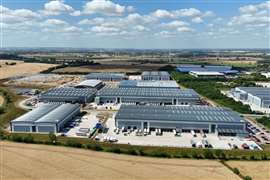Lavendon profits rise while revenues are flat
30 August 2013
Total revenue at Lavendon Group dropped by 1% to £113.6 million in the first half of 2013, with strong growth in the Middle East and France buoying the company’s results.
Conversely, profits before tax rose 17% to £11.1 million for the six months to 30 June, while rental revenue rose by 1% to £108.1 million. The latter was offset by a decline of £2.6 million in the sale of new and ex-rental fleet equipment.
Operating profits increased by 2% to £13.9 million, with margins improving to 12.2% from 11.9% during the same period in 2012. Earnings before interest, tax, depreciation and amortisation (EBITDA) were almost flat year-on-year at £34.2 million, compared to £34.1 million in the first half last year.
The company invested £27.4 million in its rental fleet and infrastructure, up from £20.8 million in the first six months last year, which included opening a depot in India, “We believe this market represents a sizable opportunity that can be developed over time through investment in response to growing demand for the use of powered access.” As of June 2013, the business was operating a fleet of 120 units.
The Middle East continued to grow strongly against equally strong growth last year, said the company. Local currency rental revenues increased by 30%, and after conversion to Sterling showed an increase of 32% to £21.8 million.
“The revenue growth has been driven by both increased volumes and pricing, particularly in Saudi Arabia where we have seen double-digit price improvements over the last 12 months,” said a company spokesman. This growth was supported by additional investment during the six months to expand the fleet size by 250 machines across the region at a cost of £13 million.
France also performed well in the first half, with Euro revenues increasing by 6% and, after conversion to Sterling, increasing by 10% to £10 million. The company put this down to improved utilisation of an increased fleet size with broadly stable pricing, driving further market share gains in a market which is relatively flat and showing little sign of recovery.
Other parts of Europe fared less well, however, with the UK's rental revenues declining by 6% to £49.1 million, reflecting difficult weather conditions at the start to the year and subdued demand from the commercial and infrastructure construction sectors. “Although recent sentiment regarding the UK economy has been more encouraging, we are not assuming a significant improvement in market conditions in the near term,” added the spokesman.
Germany saw declines too, with Euro revenues also dropping 6%, or 4% after conversion to Sterling at £20.8 million. These figures were also blamed on adverse weather conditions during the first six months and a year-on-year pricing decline of 6%, as the company became more price competitive to drive utilisation levels.
In Belgium, Euro rental revenues declined by 11%, and after conversion to Sterling showed a decline of 8% to £6.5 million.
For the whole of 2013, Lavendon says it will invest £53 million, including substantial refreshment of the European rental fleet; continued expansion in the Middle East; on-going development of its BlueSky range of machine attachments and the implementation of the company’s upgraded IT platform across the group.
As of 30 June, the group's fleet rental size stood at 19,800 machines. During the second half the company will target under-utilised assets and replace them with higher demand assets. “This will see a relative shift in our fleet mix across the year towards smaller units, as we look to meet the growing demand for this particular product group,” said the company spokesman.
Lavendon Group’s chief executive officer, Don Kenny, concluded, “The Group has made further good progress in the first half of the year with our financial results in line with the board's expectations. There has been a continued improvement in our profitability from relatively stable revenues.
"Whilst recognising the continuing economic uncertainty, the board believes that the Group is well positioned to deliver its expectations for 2013 and substantial shareholder value in the medium term."




